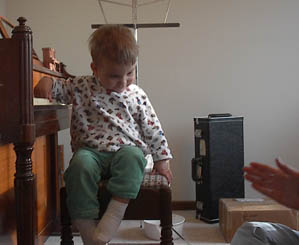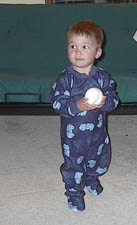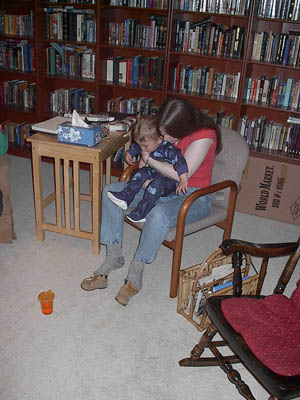|
8 April 2004 Mark wants to start a poll on how many body parts Anakin Skywalker loses in Episode 3. We know he has a nose as of the last movie, and both eyes and a mouth, but that's pretty much all we can swear to. And the hand thing has already happened. So...step right up, place your bets here. We also talked about why the Ayatollah Khomeini was such a figure of terror in my childhood. It was a good dinner conversation in general. There was one more thing, but I'm forgetting it. Ah well. After reading an interview online this morning, I came to a tentative conclusion: I think it's often a mistake for people who like an author to decide why other people don't like him/her. Some people can spot it -- Abby, for example, likes Robert Jordan but seems to be able to pick out the reasons why someone else wouldn't in a fair amount of detail. But I think it's really easy to fall into the trap of, "Oh, he's too clever for them." "Her plots are too complex." "The setting is too detailed." It's too easy, in short, to turn it into a backhanded compliment to the books you love, and I think that no matter how much we love an author's work, we should recognize that there are reasons other than sheer perversity and wrong-headedness for other people not to favor it as we do. I've been noticing how many of the "misfits" in spec fic novels are not really particularly misfit. You have someone like Miles Vorkosigan: okay. There's really no denying that he's a wee mutie freak, and that's a good thing. But there are plenty of heroines who are described as unbeautiful in backhanded ways: "Her eyes were too widely spaced for beauty," and you think, oh, yes, I love a woman with eyes right next to each other. If the tear ducts can ideally be one merged tear duct like a permanent wen in the middle of her nose, that's just feminine perfection, is what that is. Or "Her chin was too strong for her face to be beautiful." Because weak chins are such a nifty thing that we all want one. You know that you're never supposed to picture Jay Leno with boobs when you read that sentence. You're supposed to picture a pert, tilted little point, accompanied by full lips and flashing eyes. (It may be that Jay Leno has full lips and flashing eyes; I've never really checked. But you know what I mean.) Sentences like this are the way of saying, "She's really pretty but nobody else thinks so, so don't feel bad if nobody's asking you out on a date. Magelady Wossname has the same problem." And here's another to use carefully: "unfashionable/unfashionably." This one gets used to indicate that something the reader's culture presumably thinks is good is really not an asset and thus the character is not a Mary Sue, don't hate her because she's beautiful, etc. etc. etc. Example: "She wore a sword belt around her unfashionably slim waist." You can do that. If you want to, you can. But your character needs to deal with different social responses than if she was the social ideal of beauty -- the rest of your world can't go around treating her like she's beautiful. If the world treats her unfashionably slim waist as though it's alluring and gorgeous, you have not created a society with different values from ours. You've cheated in an attempt to gain the reader's sympathy when you suspect he or more likely she wants to sympathize with a character who is conventionally beautiful in his or her own society, but also feels conflicted about that. If you are thinner than people around you think you should be, you will be fielding queries about your health constantly. Trust me on this one. I'm not saying your imagined societies must follow our social standards of beauty; far from it. But you have to stick with the words you use; that's why you use them. If you say, "Her auburn hair fell in unfashionable waves down her back," she should not be treated like a redhead with long wavy hair would be treated at a con; she should not be petted and admired the way many fen pet and admire long hair and the people with it. And it should get in her way unless she pulls it up/back. And so on.
So, to sum up: Okay, so that would get a little obnoxious for a whole book worth. But so does the coy "unfashionable" crap, so cut it out. If you're going to have a misfit, do like Stella did and give her a hideous, gnawed-on deformed hand that no one can really claim is just another sign of her beauty. Or make her beautiful and totally unable to understand the word "compromise" like Ansa Nikkanen in the Not The Moose. Or something. I don't care if your heroines are purty or not, but don't try to convince me that they're not if you're not going to go with it. (Same goes for heroes, but somehow it's less of a problem for heroes....) We're a genre full of self-proclaimed misfits. We like identifying with the fringes. We especially like it when the fringes can appear to be on the fringe for unjust reasons. Oh, especially if someone is picked on for being too smart or too sensitive. We love that. I'm including myself in that we explicitly: I identify with characters who are isolated in their intelligence because I've felt that way myself. It was called "high school." It's a real thing, getting negative feedback for being "the smart kid" or liking "weirdo" stuff in the arts. I don't mean to say that it isn't. But I think sometimes we respond too automatically to it, in this genre. We see the word "unfashionable," and we don't think "that guy we made fun of," we think "rebels like us!" And it just doesn't always work that way. You know what I think? I think Karina's right that "there are not simply two kinds of writing, showing and telling, but that any bit of exposition can be showing you one thing as it tells you something else." But I think it's bad when the telling of a piece of exposition contradicts the showing and the author doesn't know it. Also, I think the real rule about telling and showing is "don't suck," but people get really cranky when you propose that as a rule of writing. Even though it's a good one, and even though I admit that it's not sufficient. I don't think I'm going to have a lot of time this weekend for posting, so I'm going to just take off until Monday. I'll come back with a con report. In the meantime, I will bribe you with Roo pictures. Following the Roo pictures, a discussion of what I'm thinking about this holiday (Maundy Thursday, not Kari's birthday). It'll mostly be for the benefit of other practicing but, er...non-orthodox Christians, I think; the things I talk about as meaningful obviously won't be meaningful for you if you don't believe in the same things. If you don't care about my religion, the end of the cute baby pictures will be your signal to go on with your life. Everybody got it? Okay. On with the Roo!
 Roo is playing Auntie Mrissa's meeno. Sometimes it manages to be piano or meeano. But often it's just so darn exciting to come over and play that it's the meeno. (For those who haven't been following along, this is a contraction of "my piano." Every piano is Roo's piano. Even Auntie Mrissa's piano.) He's very gentle with it. He plays and doesn't pound (or Auntie Mrissa would have a lot more to say about how much he plays her great-grandmother's piano).
 He comes in the door and just makes a beeline for it. Sometimes he's not in the door before he starts bringing it up as a discussion point.
 Sometimes he makes his mommy laugh when he's playing with the meeno.
 He's gotten very good with phrases like "down now."
 Footie jammies and Uncle Timprov's baseball. I don't know how much cuter it can get than that, but every time I say something like that, he proves me wrong. His daddy was very clear with him that the baseball was not to touch the mouth, lest the ire of the ump be raised.
 The Po�ng is his favorite chair: low and sturdy enough to scramble into without help, easy for rocking. We play the rock-rock game in this chair.
 Auntie Mrissa is singing yet another round of "this is the way the lady rides." Someone knows who the sucker is.
 Roo and his daddy and an assortment of musical instruments.
 Roo tries out Auntie Mrissa's recorder. So much good noise to be made at Auntie Mrissa's house.
 He brought me his shoes to put on. He was fairly insistent. Also you can see the wrong shoji screen in its box in the background, but now we have the right one. Also you can see the magazine rack. We are real grown-ups. We have a magazine rack. That's how you can tell. So. It's Maundy Thursday. A lot of sermons tonight will mention that "Maundy" comes from the same root as "mandate," but not all of you know that, so I thought it was worth a mention. This is the day western Christians of many flavors celebrate the institution of the sacrament of communion, as well as the day we remember Jesus' betrayal. (I'm not sure what eastern Christians do, so I will not speak for them.) I've talked about the loss of the literal in literary terms, but it's a concern for me in religious terms as well. Jesus sat down with his disciples and had a meal. It was a very specific meal: a seder. I think both of those literal truths tend to get lost in our rituals: that it was the Jewish holiday of Passover and that it was a full meal. We can (should!) learn a lot from Passover. In liberal Christian churches, we're often reminded that Jesus was a Jew, and this is important to remember, to understand the background of the times and to combat anti-Semitism as much as possible. But Passover isn't just any old holiday. It's a holiday celebrating a release from bondage and a relief from tribulations (and therein lies a whole sermon, I'm sure), and it's a holiday of questions. At seders, there's a traditional set of questions about why they're doing what they're doing, why they're doing it that way and no other. And they have answers: we eat the bitter herbs because of this and the charoset because of that. Here's why the bread has no leavening. This is what we remember. Christian services are very strong on what we're remembering, but why we're remembering it in the specific ways we are is less clear. We eat the bread and drink the wine, we are together, and God, who is love, is with us. And it's good, but...why do we eat such small morsels? Why do we do it in a sanctuary with pews? Why do we remember Christ's supper by having something that barely resembles a meal at all? Traditionally, Christians take communion in very tiny bits. We eat a scrap of bread or a wafer; we receive a single swallow from a common chalice or a thimbleful of wine. We believe that God has grace and love in abundance, but when it comes to the ritual we sometimes call the Lord's Supper, it's two mouthfuls. I'm sure this was wise where Christianity was persecuted in the early days, and where it's illegal or in trouble now. Most of the people who can read this are not in that situation. I also know that the church has a lot of things that could be done with the budget of a catered full meal. Still. I think it would also be in the spirit of Maundy Thursday to have a potluck. We could set tables with open chairs not for the prophet, but for neighbors, for those who need food or warmth or companionship or listening ears. When we share the bread and the wine and Christ is with us, we could ask ourselves how this night is the same as all other nights. It's the same because we eat and drink and think of the ways in which love lives in our lives, and of the ways in which we deny or betray that love. And as much as ritual sometimes gives people a sense of the holy, I think it also can make things exotic that are really very simple, very human and very earthy. I don't think that Jesus's meal was silent and miniscule. I think that the disciples bickered and laughed and sometimes listened to what Jesus said and sometimes daydreamed or had their own conversations. I think it's clear from the Gospels that some of Jesus' disciples were more likely to help with the dishes than others, that some resented that and others didn't. I think it was a meal with friends. There's meaning and purpose in that, too, if we can remember to look for it. It doesn't have to be formal and distant from us; or rather, formal distance doesn't have to be the only option if it works for some of us and not for others. One of my favorite hymns is #43, and some of you can already sing the chorus with me: "I don't believe you. You have the whole damn thing all wrong. He's not the kind you have to wind up on Sundays." And while that's awfully pugnacious for this particular topic, I do think that taking a step back from the rituals we do and poking at why we do them that way can be a very good thing.
And the main page. Or the last entry. Or the next one. Or even send me email. |